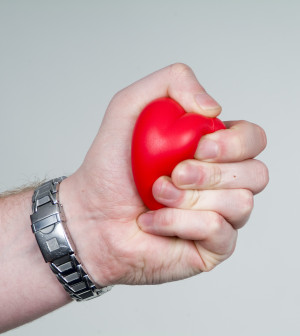- Could Artificial Sweeteners Be Aging the Brain Faster?
- Techniques for Soothing Your Nervous System
- Does the Water in Your House Smell Funny? Here’s Why
- Can a Daily Dose of Apple Cider Vinegar Actually Aid Weight Loss?
- 6 Health Beverages That Can Actually Spike Your Blood Sugar
- Treatment Options for Social Anxiety Disorder
- Understanding the Connection Between Anxiety and Depression
- How Daily Prunes Can Influence Cholesterol and Inflammation
- When to Take B12 for Better Absorption and Energy
- Epsom Salts: Health Benefits and Uses
Medical Pot-Painkiller Combo Isn’t Always Recipe for Abuse


Medical marijuana users don’t appear to increase their risk for drug or alcohol abuse if they also take prescription painkillers, a new study finds.
While many people use medical marijuana as an alternative to narcotic (opioid) painkillers, some use both to cope with chronic pain, the researchers said.
“We expected that persons receiving both cannabis and prescription opioids would have greater levels of involvement with alcohol and other drugs,” said study author Brian Perron of the University of Michigan School of Social Work in Ann Arbor.
“However, that wasn’t the case — although persons who were receiving both medical cannabis and prescription opioids reported higher levels of pain, they showed very few differences in their use of alcohol and other drugs compared to those receiving medical cannabis only,” he said.
The study, published in the May issue of the Journal of Studies on Alcohol and Drugs, included 273 patients at a medical marijuana clinic in Michigan. More than 60 percent of them had also used prescription painkillers in the past month.
Overall, the medical marijuana users had higher rates of alcohol and drug use than people in the general population. But there was little difference in use of alcohol or other drugs — such as cocaine, sedatives, street opioids like heroin, and amphetamines — between medical marijuana patients who used prescription painkillers and those who did not use painkillers.
Communication between doctors and patients using medical marijuana is crucial, Perron said in a journal news release.
“We actually know very little about who is receiving both medical cannabis and prescription pain medications,” he said.
“Physicians do not actually ‘prescribe’ medical cannabis — they only certify whether the patient has a qualifying condition, which allows the patient to gain access to medical cannabis,” Perron explained.
Medical marijuana dispensaries are distinct from medical pharmacies, “so physicians may not know whether a given patient is using medical cannabis, how much, and in what form,” Perron added.
More information
The U.S. National Institute on Drug Abuse has more about the medical use of marijuana.
Source: HealthDay
Copyright © 2026 HealthDay. All rights reserved.










